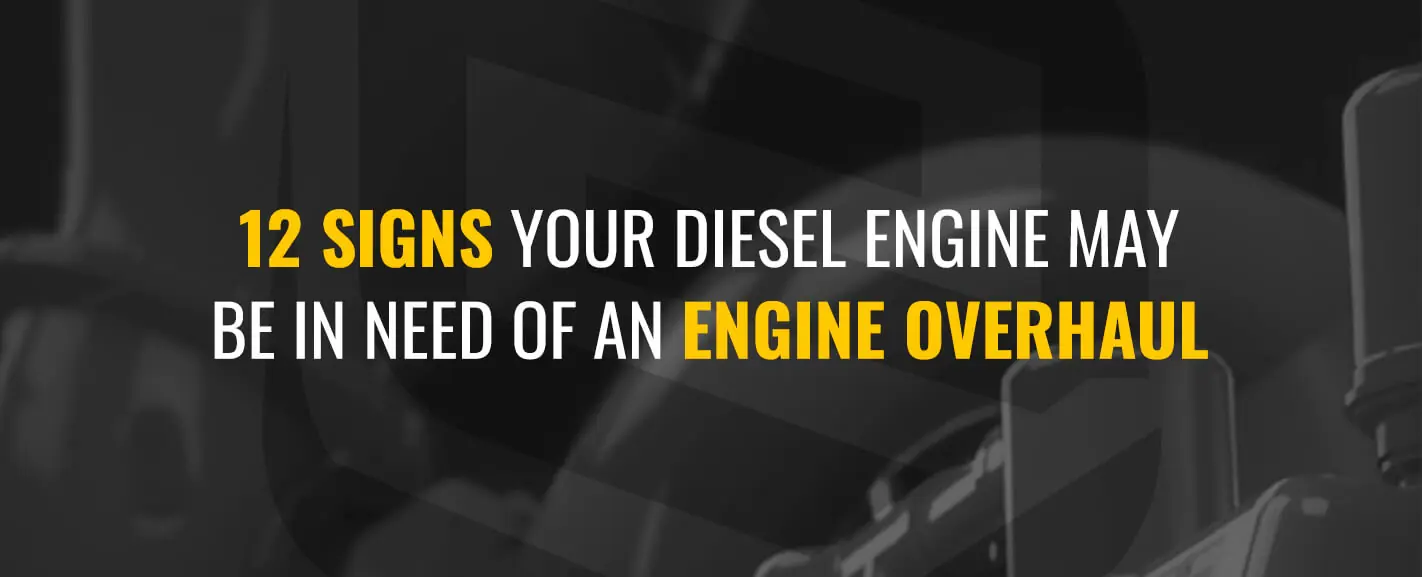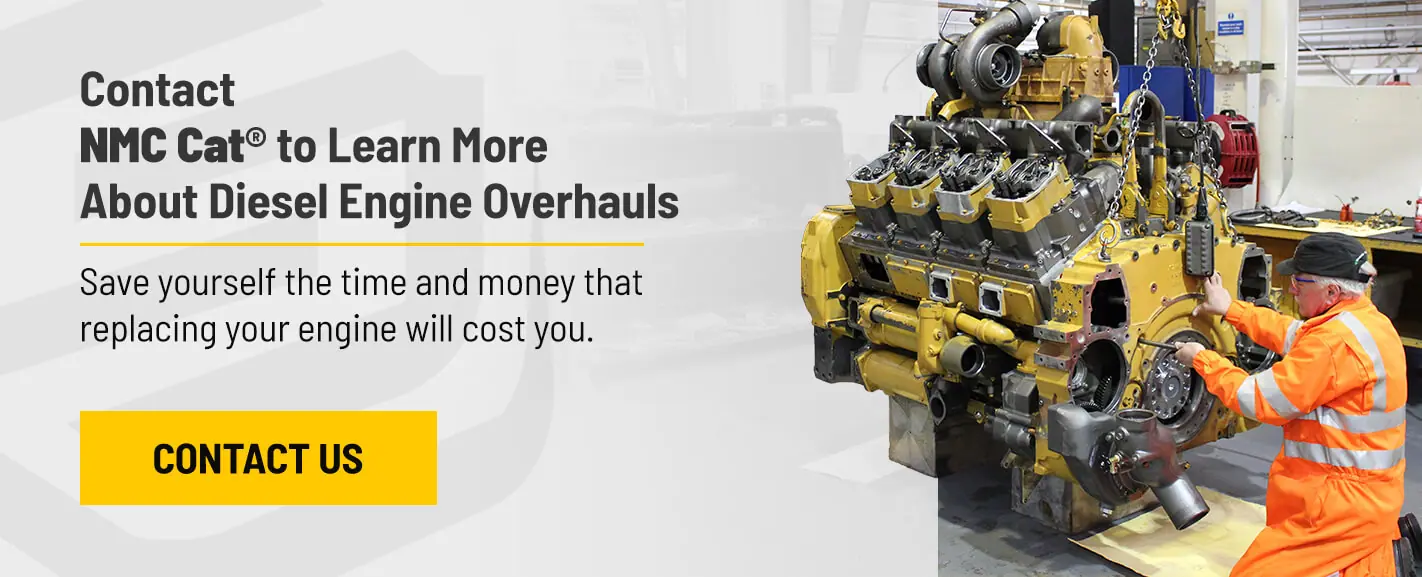
12 Signs Your Diesel Engine May Be in Need of an Engine Overhaul
Category: Equipment and Solutions
Diesel engines require regular maintenance and attention, as minor issues can quickly lead to costly damages. Luckily, an engine overhaul is a good way to correct numerous problems — and it costs a fraction of the price of a replacement.
The overhaul process involves taking the engine apart and diligently identifying faulty components. Once everything is replaced and cleaned, a professional will rebuild the engine. An overhaul can help improve the performance and power of a diesel machine. Regular maintenance can also elongate the life of your engine, giving you more bang for your buck.
How do you know if you need an engine overhaul? The following are 12 signs of a bad diesel engine:
1. Oil Sludge
One of the telltale signs of an engine issue is the accumulation of oil sludge on the dipstick or fill cap. The following elements typically make up the thick mixture:
- Wasted oil
- Grime
- Coolants
The presence of oil sludge indicates that the engine’s components are not entirely lubricated. When you discover this dark residue or buildup around your engine, it might be time for an overhaul. Oil sludge can interfere with the performance of your engine and lead to several problems, from increased fuel consumption to power loss.
2. Metal Shavings
If you spot metal shavings anywhere in your engine’s oil, it is likely due to a lack of proper lubrication and friction between two components.
In the case of metal shavings, it is best to act fast. The oil quickly carries these shavings throughout your engine and can cause damage or additional problems across multiple components. This could lead to damages that are more expensive than the overhaul.
3. Increased Oil or Coolant Consumption
When you notice a surge in oil or coolant consumption regarding your diesel engine, this could indicate several problems. Worn-out piston rings often cause this issue. When the piston rings are not in their proper place, they don’t keep the diesel fuel from the engine crankcase. This fuel is not lubricating like oil, and its leaking can cause expensive damages.
Additional causes for increased oil or coolant consumption include the following:
- An oil leak
- A cracked cylinder head
- Faulty o-rings
- A cracked cylinder gasket
- Worn or flawed cylinder liners
4. Excessive Exhaust
One sign indicating your diesel engine needs an overhaul is excessive smoke. This problem can easily go under the radar, as not every operator sees the exhaust coming from the engine while in action.
Excessive exhaust can mean a few different things. If the smoke appears blue, the engine is burning oil, and the diesel fuel could potentially be flowing incorrectly. If the smoke appears white, this could indicate a coolant has leaked into the engine.
5. Knocking Sounds
You should look into overhauling your diesel engine when you hear loud knocking sounds coming from beneath your vehicle’s hood. This racket is different from typical engine sounds, and you should address it promptly.
Noisy rattling typically indicates one of the following issues:
- Poor bearings
- Faulty fuel injectors
- Wrist pin failure
- Compression problems
6. Compression Loss
Compression loss is a condition that is typically to blame for decreased performance and a loss of power. The presence of fuel or coolant leaks can contaminate the engine’s oil and result in high oil levels in the crankcase.

This predicament usually indicates leaking elsewhere inside the engine too. If your engine’s cylinders are leaking, this could be at the fault of over-worn parts that need replacement. Declining performance and leaking cylinders mean it is time for an overhaul.
7. Hitting Milestones
The frequency of engine overhauling depends on a few different factors, including damaged parts and hitting particular milestones. Depending on the manufacturer, certain models will need servicing after a specified amount of miles or years of operating.
Your vehicle may need more frequent overhauling depending on the conditions the vehicle operates in and the amount of stop-and-go traffic it endures.
8. Spun Rod Bearings
In the case of a spun rod bearing, the out-of-place bearing causes damage to both the rod journal and the rod connecting them. This may occur because of a lack of lubrication in the crankcase.
Additional harm can occur when broken rods move around the inside of the engine. In the instance of a spun bearing, it is best to get your engine overhauled to avoid costly damages.
9. Dropped Valve
A dropped valve occurs when a valve head is bent and sheared, causing it to drop into the cylinder. This fall can wreak major havoc on the entire engine system.
When a dropped valve occurs, it could mean you need to replace one of the following parts of the engine:
- Piston
- Cylinder
- Valves
If you do not address the dropped valve, it could result in needing an entirely new engine. Performing a top overhauling of a diesel engine can prevent dropped valves before they happen.
10. Turbocharger Failure
Newer diesel engines have a turbine-driven device called a turbocharger, and its job is to compress air in the engine’s cylinder. When the turbocharger is experiencing issues, it may begin to wobble. This movement is especially damaging, as even the smallest wiggle can lead to serious harm to the engine.
You’ll know your turbocharger has failed when you see thick, black smoke. This smoke means that oils entered the intake, and it is time for an overhaul.
11. Extreme Blow-By
While some blow-by is normal with diesel engines, excessive blow-by is a sign something is not quite right with your vehicle. Problematic blow-by occurs when the firing of the diesel engine is too much for the piston rings to hold back, and the heightened combustion pressure leads to excessive output. To find the source of the issue, a professional will need to perform a compression check on your engine.
Blow-by is especially common with tractor-trailers. Regular semi-truck engine repairs can prevent issues that cause extreme blow-by.
12. Rough Idle or Runaway
An engine overhaul is needed when your diesel vehicle is experiencing problems during idles or when you’re turning off the engine.
If your vehicle is bouncing when it stops, this movement is a sign of wear and tear. If your engine isn’t turning off when you try to shut it down, it may indicate that oil has entered the combustion chamber. Runaway engines can be very dangerous, and the sooner you address this issue, the better!
Contact NMC Cat® to Learn More About Getting a Diesel Engine Overhaul
With regular maintenance, your diesel engine can continue to yield its power. A diesel engine rebuilding overhaul is good for preventative care to preserve the performance and lifespan of your engine. If you are experiencing any of the issues mentioned above, it is best for both your engine and wallet to explore overhaul options.
Minor issues can quickly become major problems if professional does not address them properly and quickly. Save yourself the time and money that replacing your engine will cost you, and opt for an engine overhaul when necessary.
Interested in learning more? Contact NMC Cat on our website today!

